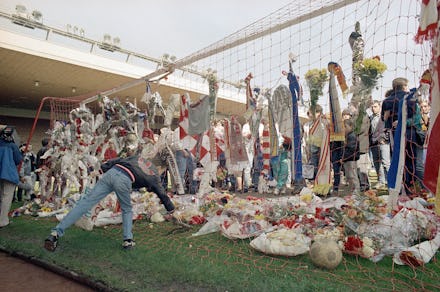The fatal Hillsborough Stadium Disaster is back in the news 30 years later. Here's why.

Nearly three decades later, a deadly event that shook the world of sports is making headlines again.
On Wednesday, prosecutors in the United Kingdom brought charges against six people for their involvement in the 1989 deaths of 96 soccer fans, many of whom were crushed to death at Hillsborough Stadium in Sheffield, England. For the families of victims of the Hillsborough Stadium Disaster, the news came as vindication after years of fighting to hold officials accountable for what transpired.
"It doesn't bring anyone back from the disaster but it sends a message of accountability out as we keep saying that nobody, but nobody, is above the law — be it the police or anybody else," Trevor Hicks, whose daughters, Sarah, 19, and Vicki, 15, were killed at Hillsborough, said, according to CNN.
What happened on April 15, 1989?
Fans flooded Hillsborough Stadium on Saturday, April 15, 1989, to see the semi-final match between the Liverpool and Nottingham Forest teams. As the BBC reported in 2016, the game was sold-out, meaning 53,000 fans were expected.
To prevent violence between fans, they were divided based on which team they supported. Liverpool fans were directed towards the Leppings Lane entrance of the stadium — the smaller side. Only seven of the entrance's turnstiles were allocated to the more-than-10,000 Liverpool fans who had tickets for the standing areas, according to the BBC.
The crowd to get into the standing area pens began to build at the stadium entrance. In an attempt to relieve the congestion, police opened a nearby exit gate, allowing thousands of people to surge into the already crowded standing areas.
Amid the ensuing chaos, fans were fatally crushed against fencing and trampled by the crowd. Minutes after kickoff, the game was called off as people tried to help the injured.
A total of 96 people were killed and more than 700 were wounded, according to the New York Times. The victims were between the ages of 10 and 67, and 37 of them were teenagers.
A struggle for justice
As the Times reported, attempts on the part of grieving families to uncover just what had led to the deadly crush went on for years. Meanwhile, authorities seemed to hold the fans responsible for the disaster.
The British tabloid media contributed to the victim-blaming, according to the Times. In the days following the tragedy, the Sun published a story saying Liverpool fans had caused it, arguing they had belligerently attacked officials.
In April 2016, after years of victims' families campaigning for answers, an inquest into the deadly crush found that the deaths had been caused not by the fans' behavior, but by police and official errors that led to the deadly overcrowding.
On Wednesday, charges were brought against six men for their roles in the Hillsborough disaster. Former South Yorkshire Police Chief David Duckenfield, who falsely claimed that Liverpool fans had opened an exit gate, faces the most serious criminal charges: manslaughter charges in 95 of the 96 deaths.
The others facing charges are former Sheffield Wednesday Football Club secretary Graham Henry Mackrell; lawyer Peter Metcalf, who represented the South Yorkshire Police; and officers Norman Bettison, Donald Denton and Alan Foster, the Times reported.
A lasting legacy
The Hillsborough stadium disaster had a lasting impact on British soccer. It led to a "complete overhaul of stadium-safety regulations," as Ruth Margalit wrote in the New Yorker in 2016, and to the end of standing pens as stadiums transitioned to meet a new requirement that every attendee have an assigned seat.
"Going to see a match in the eighties was often a frightening experience; it no longer is," Margalit wrote. "Soccer culture has forever changed because of Hillsborough, and is the better for it."
For the families whose loved ones died at Hillsborough, Wednesday's news was another step towards justice.
Margaret Aspinall, whose 18-year-old son James was killed, told CNN that "what has been achieved today will change things for the good of this nation and I think that's the legacy of our 96 that they would have left behind on their behalf."